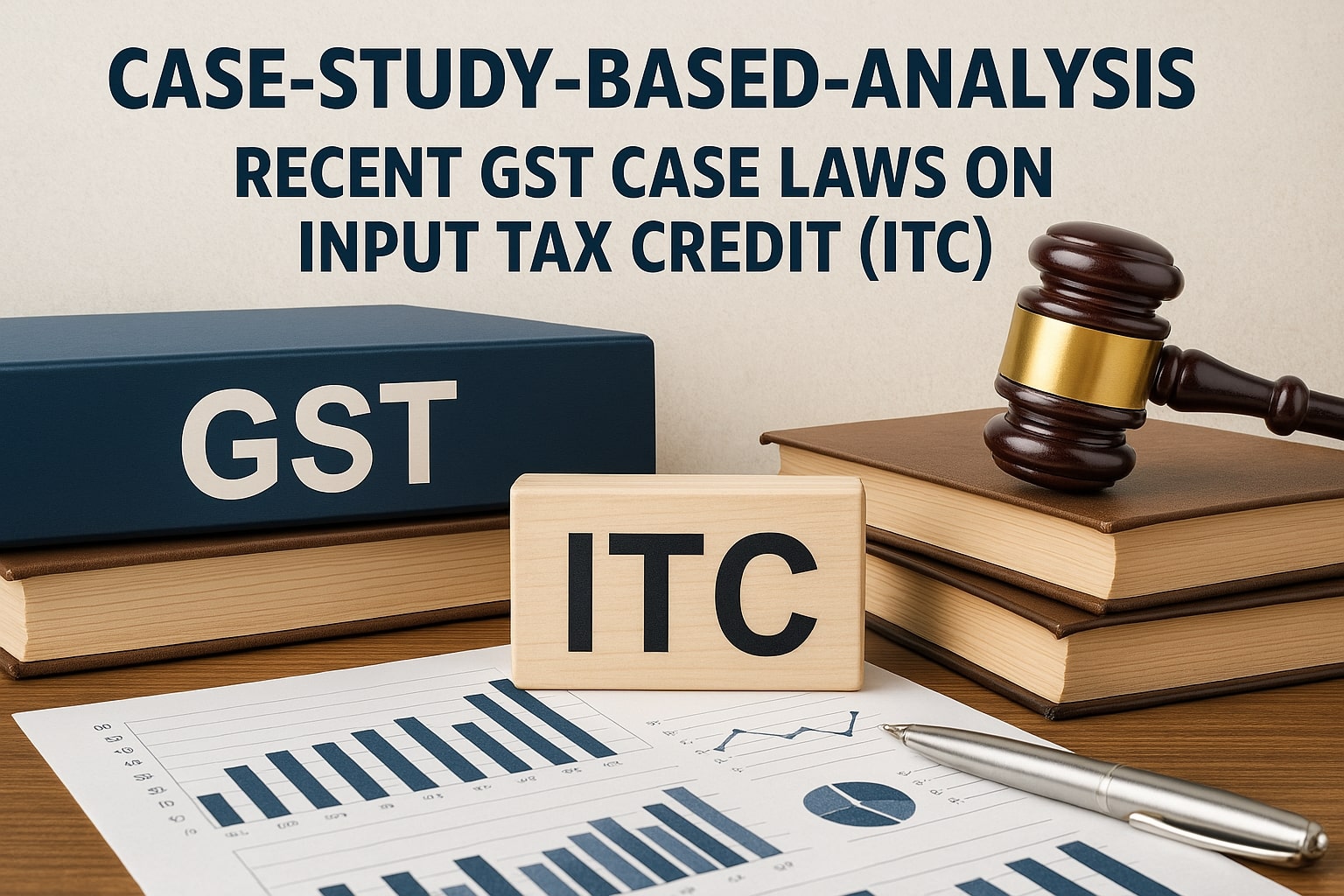View News
Case-Study-Based-Analysis-Recent-GST-Case-Laws-on-Input-Tax-Credit-ITC

Case Study-Based Analysis: Recent GST Case Laws on Input Tax Credit (ITC)
The concept of Input Tax Credit (ITC) is fundamental to India's GST regime, enabling businesses to reduce tax liability by claiming credit on taxes paid for purchases. However, interpretation and application of ITC provisions have led to significant legal challenges. The following case study-based format highlights real-world legal disputes, judicial reasoning, and key takeaways to help businesses understand and navigate ITC-related issues.
Case Study 1: Substantive Compliance over Procedural Lapses
Case: Supreme Court Dismisses GST Department Appeal
Facts: A taxpayer was denied ITC due to procedural lapses, despite having fulfilled substantive conditions.
Issue: Can ITC be denied solely on procedural non-compliance?
Judgment: The Supreme Court upheld the High Court's decision, affirming that minor procedural errors should not overshadow substantive compliance.
Takeaway: Ensure compliance with core ITC conditions. Minor mistakes should not jeopardize ITC entitlement.
Case Study 2: Retrospective Cancellation of Supplier’s Registration
Case: Delhi High Court on Retrospective Supplier Cancellation
Facts: A customer claimed ITC on purchases from a supplier whose GST registration was later canceled retrospectively.
Issue: Can ITC be disallowed for transactions made in good faith before the supplier’s registration was canceled?
Judgment: ITC cannot be denied for bona fide transactions that took place before the retrospective cancellation.
Takeaway: Businesses can protect ITC claims if transactions were genuine and supported by valid documentation at the time of execution.
Case Study 3: ITC as a Vested Right
Case: Calcutta High Court on ITC Protection
Facts: Authorities attempted to revoke accrued ITC without due process.
Issue: Is ITC a vested right once accrued?
Judgment: ITC is a vested right and cannot be withdrawn arbitrarily. Due process must be followed.
Takeaway: Taxpayers have legal standing to defend against unjust ITC denials.
Case Study 4: GSTR-2A vs. GSTR-3B Mismatch
Case: Calcutta High Court on Return Mismatches
Facts: Discrepancies between GSTR-2A and GSTR-3B led to ITC rejection.
Issue: Should genuine mismatches result in ITC denial?
Judgment: Genuine mismatches, in absence of fraud or deceit, should not lead to disallowance.
Takeaway: Accurate reconciliation is critical, but taxpayers can challenge ITC loss arising from clerical differences.
Case Study 5: Section 16(4) and Timely Claim of ITC
Case: Supreme Court Clarifies ITC Time Limits
Facts: Businesses filed ITC claims beyond the deadline under Section 16(4).
Issue: What is the importance of statutory timelines in ITC claims?
Judgment: Statutory deadlines must be respected, though courts may offer leniency in genuine hardship cases.
Takeaway: Adhere to filing deadlines to preserve ITC eligibility.
Landmark Case: Vidya Drolia vs. Union of India
Facts: ITC was denied due to the supplier’s registration being canceled after the transaction.
Issue: Can taxpayers lose ITC because of supplier’s subsequent registration issues?
Judgment: The Supreme Court affirmed the taxpayer’s vested right to ITC and rejected the denial based on supplier cancellation.
Takeaway: Taxpayers should not be penalized for supplier defaults post-transaction.
Other Noteworthy Judgments
A. ITC Denial for Supplier’s Non-Payment of GST
Court: Madras High Court
Finding: ITC should not be denied to a bona fide buyer merely because the supplier failed to deposit GST.
Implication: Protects compliant taxpayers and reinforces supplier accountability.
B. Burden of Proof on Claimant
Court: Supreme Court
Finding: The claimant must maintain sufficient evidence to support ITC claims.
Implication: Robust documentation is vital—tax invoices, delivery records, and proof of payment are essential.
C. Supplier Registration Cancellation and ITC Validity
Court: Supreme Court
Finding: Valid transactions are not invalidated by subsequent supplier deregistration.
Implication: Encourages diligence in supplier selection but protects legitimate business transactions.
Conclusion
The evolving jurisprudence on GST ITC continues to emphasize fairness, compliance, and protection of taxpayer rights. These case studies provide a practical lens to understand the law's application. For businesses, timely ITC claims, diligent supplier verification, and meticulous documentation remain the cornerstones of compliance and risk mitigation under GST.
"Unlock the Potential of Legal Expertise with LegalMantra.net - Your Trusted Legal Consultancy Partner”
DISCLAIMER: THE CONTENTS OF THIS DOCUMENT ARE PROVIDED BASED ON CURRENT PROVISIONS AND INFORMATION AVAILABLE. WHILE EVERY EFFORT HAS BEEN MADE TO ENSURE ACCURACY AND RELIABILITY, NO RESPONSIBILITY IS ASSUMED FOR ANY ERRORS OR OMISSIONS. USERS ARE ENCOURAGED TO REFER TO APPLICABLE LAWS AND REGULATIONS. THIS INFORMATION IS NOT TO BE CONSTRUED AS LEGAL ADVICE, AND NO LIABILITY IS ACCEPTED FOR ANY CONSEQUENCES ARISING FROM ITS USE.

